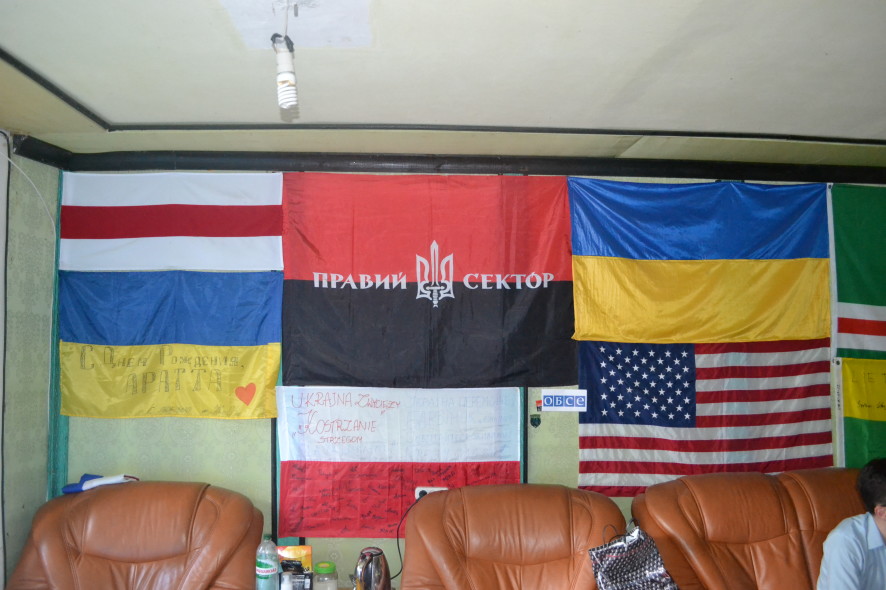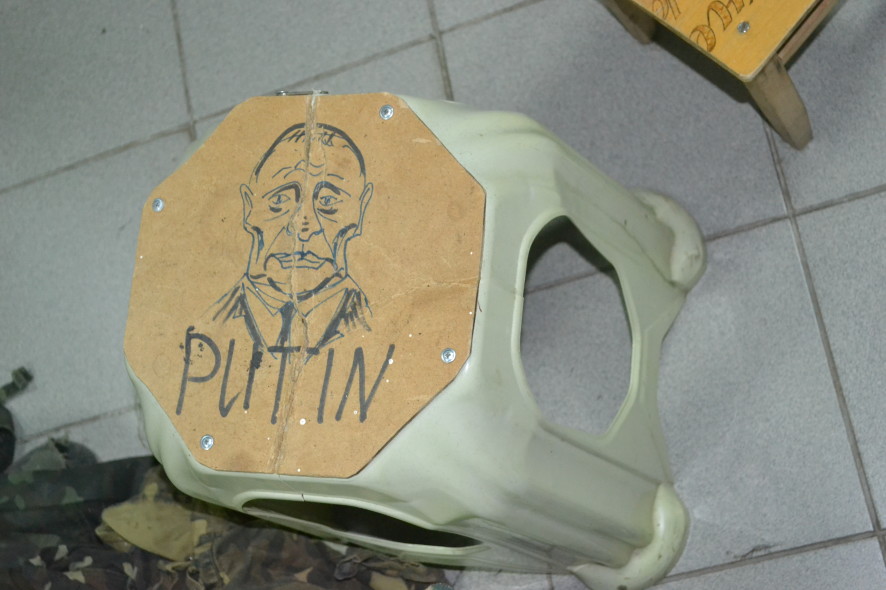by Phil Rambousek, Kramatorsk & Mangush.
The next day, we woke up in our Kramatorsk hotel, eager to get on with what we came here to do, and get to the front line. Instead however, we got to experience the universal hallmark of war reporting: being stonewalled by reluctant bureaucrats, and waiting. So much waiting, in fact, that I have come dangerously close to loathing cafes and bars, something unprecedented in all my life.
In the end, our efforts to link up with our initial objective – a paratrooper unit – were becoming so frustrating, that we decided to leave Kramatorsk on the next bus to Mariupol, at 6 AM the following day. In the meantime, we spent some more time with our guide, took a hike in the local chalk cliffs, and ended the day by watching the Euro 2016 while drinking beer with a group of journalists and soldiers. Except for the frustration of being so close and yet so far, and the lack of a viable alternative prospect for getting to the front, war seemed pretty comfortable. So far, the penalty shootout between Italy and Germany was by far the most stressful experience we had.
The n ext day, we were eager to leave. On the bus to Mariupol, we stopped at a checkpoint, and all men under forty years old were pulled off the bus and questioned. It was only a minor inconvenience, but I could not help to think about the many grizzly reasons that young men have been forced to get off the bus or train by an armed squad before. We were also beginning to see some real effects of the war. Buildings damaged by artillery fire here and there, soldiers, tank barriers, barbed wire, and the eerie and completely abandoned two lane highway to Mariupol.
ext day, we were eager to leave. On the bus to Mariupol, we stopped at a checkpoint, and all men under forty years old were pulled off the bus and questioned. It was only a minor inconvenience, but I could not help to think about the many grizzly reasons that young men have been forced to get off the bus or train by an armed squad before. We were also beginning to see some real effects of the war. Buildings damaged by artillery fire here and there, soldiers, tank barriers, barbed wire, and the eerie and completely abandoned two lane highway to Mariupol.
Upon arriving in Mariupol, we set out for the nearby town of Mangush, which serves as the headquarters of the 8th Battalion of the controversial Right Sector, or Pravyi Sektor.
The PravSeks, as they call themselves, originated in the chaos of the 2013 Maidan protests. It sought to organise the students and street fighters’ efforts against the riot police. Since then, it has mutated many times, and the remaining PravSeks fighters have mostly followed a new splinter organisation of their original founder, Dmytro Yarosh.
We were allowed to interview whomever we wanted, and spent the night at their barracks. Everything was different when it came to taking photos. Frustrated with the soldier’s excuses that they were not allowed to have their photos taken, I complained to the commander, who said that he gave no such order. When I triumphantly returned to the troops and readied my camera, they explained that I had misunderstood; the photogenic soldiers had unfortunately just left the front, they said, and who could possibly be interested in photos of the ugly ones who were left behind? For the sake of building rapport, I went along with their jokes and put my camera away.
The 8th Battalion is a light infantry unit of a few hundred soldier, mostly from the west of Ukraine. A sign on the HQ door reads “the 8th does not speak the language of the collaborators”- a reminder to stick to Ukrainian, a second language to many, said the Chief of Staff. The Chief of Staff himself was in his mid-twenties, about our age, and had just completed a degree in history when the Maidan revolution happened. He spoke intelligently about why he was fighting and about his battalion’s role in the war. He said that Ukraine was being let down by its corrupt government as well as the West. Above all, he stressed, Ukraine must withdraw from the Minsk Agreement and push uncompromisingly for its lost territory. We had to agree that the Agreement existed only on paper, anyway.
Given the PravSek’s reputation as being a virtually fascist organisation, I was stricken by how ordinary these people seemed. To me, they represented a rather accurate depiction of Ukrainian society. The female soldiers we spoke to joined up for the simple reason that the regular army did not accept women for front-line positions. Some of those we spoke to said they had problems with the law before the war. One of these soldiers in particular said the war saved him, in a way, from a life of total instability. He said he had spent his entire life prior to it on the road; moving from city to city, running away from the police as far as St Petersburg, and trying out an endless number of professions:
“I think I was best at selling sunglasses”, he said; “you wouldn’t believe how much money you can sell this for”, he continued, pointing to his – given the circumstances oddly stylish – pair of glasses on the table.
think I was best at selling sunglasses”, he said; “you wouldn’t believe how much money you can sell this for”, he continued, pointing to his – given the circumstances oddly stylish – pair of glasses on the table.
Many in the unit were above fifty, or they at least looked like it, and at least a few significantly overweight for a soldier. Almost all had served in the Soviet army, mostly in the infantry, but one was a major, no less, on a Soviet submarine. While I was less convinced by the dedication to the cause of the small time crooks, most of them seemed unified in their passion for the war. They all agreed that they were better fighters with higher morale than the Ukrainian conscripts. Some said that if only the government let them have a bigger role and gave them more independence and support, they would win the war in no time.
Unexpectedly, we had the opportunity to meet the members of an attached Chechen battalion, who asked us to interview their commander, known as Muslim. These were obviously seasoned and ruthless fighters, with flowing beards, which they incessantly stroked, and scarred by gunshot wounds. Before coming to Ukraine, some had fought for ISIS – as we were surprised to learn – and most had spent their entire lives fighting the Russians in the Chechen wars. The Chechens were an entirely different sorts of people, who went anywhere anyone happened to be fighting Russians. Despite their intimidating appearance, they impressed us with their sense for humour. When they asked why the West has not helped their plight, and whether anyone cared for the situation in Chechnya today, I assured them that the West hasn’t forgotten.
I went to bed most impressed by this unexpected encounter, and thoroughly depressed by the tragic fate of this tiny nation. Partly because of their tragedy is determined by the simple fact that they are located in the wrong part of the world, and partly because I knew full well that the fate of the Chechens has long been forgotten.








